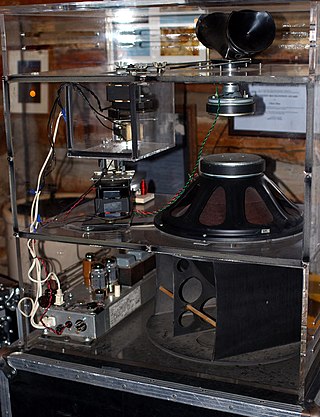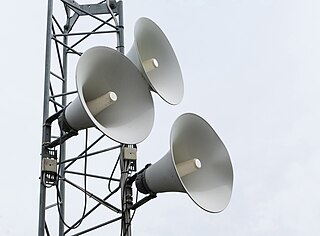
The Leslie speaker is a combined amplifier and loudspeaker that projects the signal from an electric or electronic instrument and modifies the sound by rotating a baffle chamber ("drum") in front of the loudspeakers. A similar effect is provided by a rotating system of horns in front of the treble driver. It is most commonly associated with the Hammond organ, though it was later used for the electric guitar and other instruments. A typical Leslie speaker contains an amplifier, a treble horn and a bass speaker—though specific components depend upon the model. A musician controls the Leslie speaker by either an external switch or pedal that alternates between a slow and fast speed setting, known as "chorale" and "tremolo".

A guitar amplifier is an electronic device or system that strengthens the electrical signal from a pickup on an electric guitar, bass guitar, or acoustic guitar so that it can produce sound through one or more loudspeakers, which are typically housed in a wooden cabinet. A guitar amplifier may be a standalone wood or metal cabinet that contains only the power amplifier circuits, requiring the use of a separate speaker cabinet–or it may be a "combo" amplifier, which contains both the amplifier and one or more speakers in a wooden cabinet. There is a wide range of sizes and power ratings for guitar amplifiers, from small, lightweight "practice amplifiers" with a single 6-inch speaker and a 10-watt amp to heavy combo amps with four 10-inch or four 12-inch speakers and a 100-watt amplifier, which are loud enough to use in a nightclub or bar performance.

A public address system is an electronic system comprising microphones, amplifiers, loudspeakers, and related equipment. It increases the apparent volume (loudness) of a human voice, musical instrument, or other acoustic sound source or recorded sound or music. PA systems are used in any public venue that requires that an announcer, performer, etc. be sufficiently audible at a distance or over a large area. Typical applications include sports stadiums, public transportation vehicles and facilities, and live or recorded music venues and events. A PA system may include multiple microphones or other sound sources, a mixing console to combine and modify multiple sources, and multiple amplifiers and loudspeakers for louder volume or wider distribution.

The Fender Musical Instruments Corporation is an American manufacturer and marketer of musical instruments and amplifiers. Fender produces acoustic guitars, bass amplifiers and public address equipment; however, it is best known for its solid-body electric guitars and bass guitars, particularly the Stratocaster, Telecaster, Jaguar, Jazzmaster, Precision Bass, and the Jazz Bass. The company was founded in Fullerton, California, by Clarence Leonidas "Leo" Fender in 1946. Andy Mooney has served as the chief executive officer (CEO) since June 2015.

Peavey Electronics Corporation is a privately-owned American company which designs, develops, manufactures, and markets professional audio equipment. Headquartered in Meridian, Mississippi, Peavey is one of the largest audio equipment manufacturers in the world.
Orange Music Electronic Company is an English amplifier manufacturing company, noted for their products' distinctive sound and the bright orange Tolex-like covering of their heads and speaker cabinets. The company was founded in 1968 by Cliff Cooper, who decided to build his own amplifiers when vendors refused to supply his West End musical instrument store, Orange Store, due to Cooper's youth and countercultural image. The brand's early amps were adopted by Peter Green of Fleetwood Mac and were used on Stevie Wonder's Superstition, which brought Orange worldwide recognition. The brand's "Pics Only" models—nicknamed for their use of symbols rather than text on their control panels—were released in the early 1970s to much success and established a signature "Orange sound." However, large-scale production of Orange Amps ceased in 1978 and Cooper spent the '80s building and selling amps in limited numbers. After a line of reissue models licensed by Gibson in the early '90s proved unsuccessful, Cooper regained control of the brand and found new success with the 1998 release of the AD30, with notable fans like Jimmy Page. In 2003, Orange released the Rockerverb series, which has become a favorite amp among heavy metal guitarists.
Carvin Corporation is a family-owned San Diego, California, manufacturer of guitar amplifiers and audio equipment. The company is known for its early work using plastics in the 1940s, making electric guitars from Resinox.

Ampeg is a manufacturer best known for its bass amplifiers.

Hiwatt is a British company that manufactures amplifiers for electric guitars and electric basses. Starting in the late 1960s, together with Marshall and Vox, Hiwatt contributed to the sonic image popularly termed "British sound".

Jean-Yves Thériault is a Canadian musician who was the bassist for thrash/progressive metal band Voivod. He co-founded the band and appeared on the first six albums – War and Pain, Rrröööaaarrr, Killing Technology, Dimension Hatross, Nothingface, and Angel Rat. He departed the group in 1991 for personal reasons, and went on to co-found The Holy Body Tattoo Dance Society from 1992 to 1999. He composed, produced and engineered the scores for "White Riot", "L'Orage", "Poetry & Apocalypse", and "Our Brief Eternity".

Astoria is a grand houseboat, built in 1911 for impresario Fred Karno and adapted as a recording studio in the 1980s by its new owner, Pink Floyd guitarist David Gilmour. It is moored on the River Thames at Hampton in the London Borough of Richmond upon Thames. Gilmour purchased the boat in 1986, because he "spent half of [his] life in recording studios with no windows, no light, but on the boat there are many windows, with beautiful scenery on the outside".

A bass amplifier is a musical instrument electronic device that uses electrical power to make lower-pitched instruments such as the bass guitar or double bass loud enough to be heard by the performers and audience. Bass amps typically consist of a preamplifier, tone controls, a power amplifier and one or more loudspeakers ("drivers") in a cabinet.
"Sorrow" is a song by the English band Pink Floyd. Written by the band's singer and guitarist David Gilmour, it is the closing track on their thirteenth studio album, A Momentary Lapse of Reason, released in 1987.
Luxman is a brand name of Japanese Luxman Corporation (ラックスマン株式会社) that manufactures luxury audio components. Luxman produces a variety of high-end audio products, including turntables, amplifiers, receivers, tape decks, CD players and speakers.

This is a history of the equipment that the English rock band The Who used. It also notes their influence on the instruments of the time period.

Supro is an American brand, currently owned by Bond Audio, a manufacturer of effects units. Formerly, Supro produced musical instruments as a subsidiary of Valco. The brand entered into disuse after the closure of Valco in 1968, being later revived in 2013.

Watkins Electric Music (WEM) is a British company known for manufacturing PA systems, the Copicat tape echo unit, guitar amplifiers, and electric guitars.

Yorkville Sound is a Canadian manufacturer of audio amplifiers, loudspeakers and related professional sound reinforcement equipment. Based in Pickering, Ontario, Canada, the firm has a global presence as an importer and exporter of audio electronic products.

Jimbo Wallace is an upright and electric bass player, vocalist, and songwriter in the psychobilly and rockabilly genres. He has played bass in the Reverend Horton Heat band since 1989. He is the most-tattooed member of the band.
















